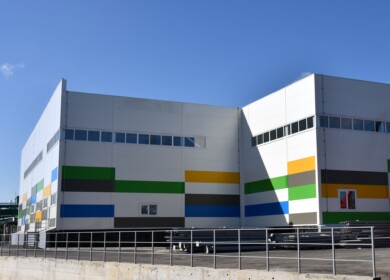Avgust Celebrates Its 33th Anniversary and Reports Robust Production Results

Almost every fourth hectare of sown area in Russia in 2023 will be treated at least once with chemical plant protection products from the Avgust company. It’s expected that in terms of a single application, they will be applied on an area of about 62 million hectares, while last year this figure was about 53 million hectares.
Once again, confidently confirming its leadership in the domestic pesticides market, on August 31, the Avgust company celebrates its 33rd birthday. The company is rapidly developing in several directions at once: in the production of plant protection products, agribusiness, and science. This diversity is now reflected in the main logo. It includes the word Avgust, three colored drops (representing a drop of water, a plant leaf and a seed), and the company’s slogan “It’s easier to grow with us.”
Avgust’s factories located in Russia, Belarus and China continue stable operation with positive production indicators. The ultra-modern enterprise “Avgust-Alabuga” in the Republic of Tatarstan, focused on the large-scale production of liquid plant protection products, annually increases shipment volumes in response to market needs. The plant “Avgust-Vurnary” in the Chuvash Republic, the oldest enterprise of the company, is being modernized in order to expand the range of products, not only for the agro-industrial complex but also for personal subsidiary plots. So, in 2023, they began equipping a building for the production and packaging of granular preparations with a line with a capacity of 1 ton per hour. In total, this season, more than 53 million units of Avgust products in small packaging were sold.
The dynamics of the development of the Avgust Group is set by large-scale investment projects implemented by it in various directions. In the Moscow region, the construction of the building of its own research center for the development of innovative plant protection products and the production of their prototypes will soon be completed. Construction work is scheduled to be completed in August 2024. In 2023, the Avgust company intensified cooperation with the Russian Agrarian Universities, so that by the time of the opening of the research center it will already be provided with promising personnel in the person of young researchers who have received the necessary skills while being students. The center will consist of chemical and biological clusters. The first will carry out the synthesis and development of technologies for obtaining active substances, the development of formulations, and the scaling of processes. Analytical laboratories will also be located here. In the biological cluster, primary screening of new active ingredients and preparations will be carried out to determine their effectiveness in the fight against weeds, plant diseases and insect pests.
To make its products more accessible to the farmers of the Central Black Earth region, at the Yelets site of Lipetsk, Avgust is building a logistics complex with a design capacity of 26 thousand pallet places, which will serve as a distribution and sorting center for plant protection products for enterprises of the agro-industrial sector, as well as farms region and neighboring regions. In the future, thanks to such an object, the period from receiving a client’s application to delivering Avgust’s products to them should be no more than 24 hours. In September, it’s planned to start recruiting and training staff.
According to the consulting company BEFL, by 2023 Avgust entered the TOP-20 largest owners of agricultural land in Russia (19th place, 260 thousand hectares). Avgust-Agro manages land in the Krasnodar region, the Chuvash Republic, and the Republic of Tatarstan, where the key part of the company’s land bank is concentrated. In addition, Avgust owns almost 15 thousand hectares of land in the Republic of Kazakhstan. From the moment of their entry into the company, the farms of Avgust have been playing the role of demonstration sites where farmers can experience how products of Avgust for plant protection work. In addition, partners are constantly interested in the No-Till zero tillage technology used in the Avgust-Agro farms. It’s also worth noting that in 2023, Avgust began implementing a project for an irrigation system for fields in the Republic of Tatarstan.
To provide logistics advantages for agricultural products and expand export opportunities, Avgust is building two powerful elevator complexes with high-performance shipping lines in the Republic of Tatarstan. Each of them will make it possible to ship the dispatch route in less than a day, while the capabilities of the currently operating sites, as a rule, do not exceed 5–6 wagons per day. The first elevator with a capacity of 112 thousand tons of one-time storage will start operating in the fall – after the commissioning of the first stage of the complex. Due to its location on the riverside, it will be possible to send grain from here not only by rail and road but also by water. The second elevator, located in the Bugulma district of the Tatarstan Republic, began to be built in summer 2023, its one-time storage capacity will be 100 thousand tons. Both elevators should reach their design targets in 2025. In addition, in order to improve logistics, Avgust is starting to form its own rolling stock.
This autumn, another subsidiary of Avgust will launch its own seed plant with a design capacity of 10 tons per hour. It’s planned to produce highly reproducible seeds of winter and spring wheat, as well as peas. The enterprise is equipped with high-tech equipment, which will be used for multi-stage cleaning and grain calibration, multi-layer dressing with liquid and powder components.
In the first half of 2023, Avgust’s dairy farms sold 18.8 thousand tons of milk, which was supplied to the milk processing plants of Tatarstan, Chuvashia, Bashkiria and the Samara region. At the moment, the farms of Avgust-Agro contain about 8 thousand heads of cattle, while modern robotic dairy complexes are being built instead of old unproductive farms. So, in the Republic of Tatarstan, two stages of the robotic dairy complexes for 2.4 thousand heads of dairy herds are already fully operational, and in 2023 this complex received the status of a breeding reproducer and officially began breeding Holstein cattle. In the Leninogorsk district, after reconstruction, the Yaltau dairy farm for 600 cows is successfully operating, in 2024 it’s planned to launch its second stage for 400 cows. The robotic dairy complex Stepanovka in the Menzelinsky district for 1.2 thousand cows is at the launch stage. Also in 2023, the construction of the largest dairy farm Ulyankovo in the Kaibitsky district of the Republic of Tatarstan for 3.7 thousand cows began.
Enjoyed this story?
Every Monday, our subscribers get their hands on a digest of the most trending agriculture news. You can join them too!













Discussion0 comments